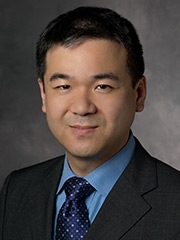Katsuhide Maeda, MD, PhD, Named Surgical Director of CHOP's Lung and Heart Transplant Programs
Published on
Published on
 Katsuhide Maeda, MD, PhD
Katsuhide Maeda, MD, PhD, has been appointed the Surgical Director for the Heart Failure and Transplant Program and the Lung Transplant Program at Children's Hospital of Philadelphia (CHOP).
Katsuhide Maeda, MD, PhD
Katsuhide Maeda, MD, PhD, has been appointed the Surgical Director for the Heart Failure and Transplant Program and the Lung Transplant Program at Children's Hospital of Philadelphia (CHOP).
Currently Dr. Maeda serves as the Director of Mechanical Circulatory Support and ECMO and the Surgical Director of Cardiac Lymphatics in the Cardiac Center. He also holds the Endowed Chair in Pediatric Cardiothoracic Surgery. A world leader in the field of mechanical circulatory support in children, Dr. Maeda has authored more than 90 papers and currently serves on the editorial board of the Journal of Thoracic and Cardiovascular Surgery.
“I’m honored by this appointment and excited to lead as Surgical Director of these two transplant programs,” said Dr. Maeda. “In all my roles, my goal is not only to improve the lives of the individual children I treat, but to contribute something to the medical world, develop new treatments that push the envelope, and make a difference for all children.”
Dr. Maeda received his Doctor of Medical Science degree from the Graduate School of Medicine, University of Tokyo, Tokyo, Japan. His PhD thesis was on lung pathology related to congenital heart surgery. He was trained in general surgery, cardiothoracic surgery and cardiology, and therefore has triple board certifications in Japan. He was a clinical fellow at Fukuoka Children's Hospital, Fukuoka, Japan, and a research fellow at the Division of Pediatric Cardiac Surgery, Department of Cardiothoracic Surgery, Stanford University School of Medicine, Stanford, Calif.
He came to CHOP in fall 2020 from Stanford, where he served as the Surgical Director of Heart and Lung Transplantation, the Surgical Director of Pediatric Ventricular Assist Support, and the Surgical Director of Adult Congenital Heart Disease. While there, he led one of the biggest pediatric heart transplant programs in nation and developed the largest single ventricular assist devices (VADs) program.